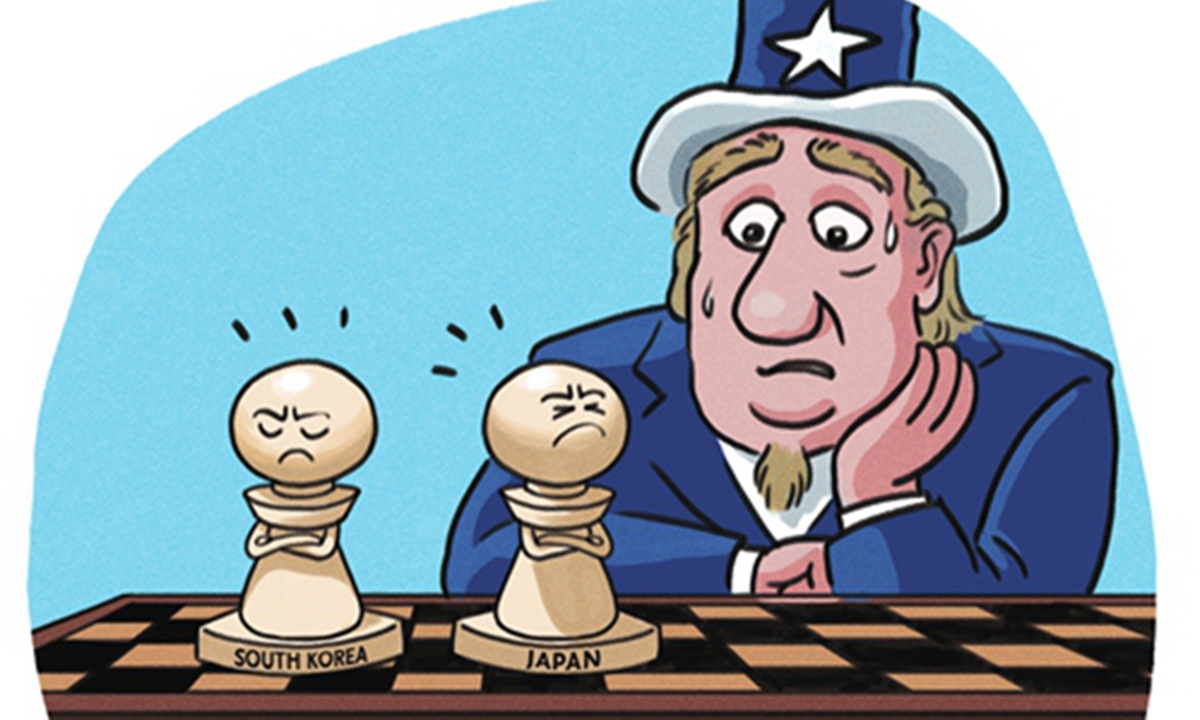
Illustration: Liu Rui/GT
Are the US, Japan and South Korea moving toward a security bloc similar to a military alliance? Such concerns are growing. On August 18, US President Joe Biden will invite the leaders of Japan and South Korea to attend the Camp David summit. It is said that Washington is pushing for a "historic joint statement," which may include plans to boost extended deterrence and economic security cooperation plans for "building a global supply chain." Ranging from defense to economy and other fields, the summit has not yet started, but the feeling of a cold war it reveals has spread, casting a shadow of camp confrontation in the Asia-Pacific region.
Camp David is the place where the US presidents often vacation over the past few decades. The US often hosts major foreign affairs activities there, while also using it to highlight good personal relationships with the meeting participants. This time Washington asks the leaders of Japan and South Korea to Camp David, demonstrating the meeting's purpose as well as the US' expectations for the trilateral alliance. The White House said the three leaders will celebrate a "new chapter in their trilateral relations," and the US ambassador to Japan wrote on Twitter that the summit promises to make history and "will lead to a strategic paradigm shift." Some analysts believe that this summit is likely to mark the beginning of building a trilateral military cooperation system between the US, Japan and South Korea.
On the surface, the US, Japan, and South Korea are under the banner of "countering North Korean's growing nuclear threat," but in fact, it has always been US' desire to build a "mini-NATO-style" trilateral military alliance in Northeast Asia. In the past, due to historical conflicts and current grudges between South Korea and Japan, as well as the prosperity of economic cooperation in Northeast Asia, it was once considered "almost impossible" to realize such a trilateral military cooperation. However, after the Yoon Suk-yeol administration came to power, Washington has tried its best to encourage South Korea to make concessions to Japan, and touted the "reconciliation" between Japan and South Korea as a "fundamental change" since World War II. Obviously, the so-called "fundamental change" has a strategic perspective of confrontation between major powers, and this perspective can only come from Washington.
Such trilateral cooperation is unlikely to reassure other countries in the region. Once it takes shape, it will divide the countries in this region into two categories: One category consists of countries that are certified by the collective security mechanism of the US, Japan, and South Korea as "like-minded" while the other category consists of countries outside the collective security system, often labeled as "aliens" and "threatening." If collective security collapses, will the pursuit of "deterrence" and absolute security by the US, Japan, and South Korea lead to a security dilemma in the Asia-Pacific region, resulting in a geopolitical tragedy? It's likely. An American scholar has already claimed a statement by Tokyo and Seoul affirming that their security is interconnected would be historic, and "it would send a message of common interest and purpose that would be heard of course in Pyongyang, but perhaps even more loudly in Beijing." It seems that some people in Washington are eagerly anticipating the arrival of this day.
Of course, whether the US, Japan, and South Korea can truly reach this stage is still unknown. The grandiose rhetoric of the US cannot deceive the people of Japan and South Korea, especially the South Korean people. The recent dangerous trends among the three countries have already caused widespread concern and vigilance within South Korea. For example, an editorial in The Hankyoreh argues that a quasi-alliance with Japan is in interest of US, not necessarily South Korea, and standing on the front line of efforts to contain China according to US strategy without managing its tensions with China "is likely to significantly jeopardize South Korea's security and economy." An editorial in the Korea JoongAng Daily also suggests that "the Yoon administration should consider the China risk even while strengthening the trilateral cooperation in Camp David, and must engage in diplomacy to help reactivate the tripartite summit with Japan and China."
However, regardless of the circumstances, this incoming summit is indeed pushing the Northeast Asian region toward a new historic crossroads. On one side of the crossroads lies the continuation of the cooperation and prosperity in the Asia-Pacific region, along with the resolution of conflicts through true multilateralism to achieve common security. On the other side is the emergence of a trilateral military alliance, which will plunge the Northeast Asian region into a profound security trap and potentially alter the trajectory of its future development. Both Japan and South Korea are located in Northeast Asia, deeply integrated with the security and prosperity here. The path they choose will leave completely different footnotes in history. It is hoped that these two countries will carefully consider their actions before proceeding.




